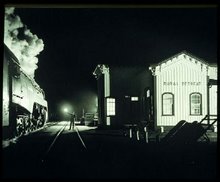Nobody asked but ...
As much of a Jefferson admirer as I am, I regret that he misunderstood the inevitability of the machine and his own naivete of trust in human reason as an antidote.
But we must remember that Jefferson had little to do with the chains and bonds of the ruse that is called the Constitution of the United States. His contribution was the soaring Declaration of Independence. He was safely tucked away with the earthly delights of Paris, as President Washington's Minister to France, during the time that the Articles of Confederation were dying a predictable death -- the critical 5-year run-up to the Constitution's drafting and ratification.
It seems that Jefferson was still romantically attached to liberty; but his eyes and his dreams were on the arising French Revolution. He must have assumed he had left the American experiment in good hands. This is the nature of idea men -- they are great at founding dreams, but they are terrible at (if not entirely absent during) implementation. They lack the patience for detail, they have scorn for micro managers. We need only look at how Jefferson managed his personal life for vivid illustration. He died deeply in debt, and unable to leave his dear Monticello to his family.
I'm not saying that Jefferson had his head in the clouds. I'm saying he was a minarchist, at least, and an anarchist at heart, in my view. The trouble of course was that Jefferson was patiently waiting for natural law to assert itself, while hotspur Alexander Hamilton was sucking all of the air out of the free-spirited new nation.
Hamilton was sharpening the politician's technique of the big lie -- tell the people what they want, then promise delivery of these things, then begin maneuvering to withhold exactly these same things, planning instead to give them to your cronies.
Hamilton was a master of distraction. He established what the Constitution should do by tendering a draft that no one would like, which draft was almost casually laid aside by the deciders. Then Hamilton even departed the conference without voting on the final version. But his yes men whom he left behind at the conference knew precisely what to do.
I have often said that the Bill of Rights was a direct distraction and even a kind of subliminal list of all of the rights of the people that were intended for subordination. In its naked state, at drafting time, it looked like a list of things the government could not do. It is entirely unlikely that someone who had a positive expectation for the Bill of Rights could foresee the contortions of rationalization that ill-intended bureaucrats could evoke to render the enumerated "rights" as a nest of statist vipers.
But I toiled in the ruined vineyards of statism for many years, where I could see the modus operandi. It was: build a cover of words, what words makes no difference, what context makes no difference. Laws, legislation, regulations, interpretations are all clay in the hands of the seasoned bureaucrat. Shape them as to meet the exigencies. The oligarchy has every minute of every day to fashion schemes around what is naturally right. The victims, who have their promised and inalienable rights alibied away, never see the lightening bolt that strikes them.
To preserve our independence, we must not let our rulers load us with perpetual debt. We must make our election between economy and liberty, or profusion and servitude. . .I place economy among the first and most important of republican virtues, and public debt as the greatest of the dangers to be feared.
– Thomas JeffersonYet we bound ourselves, and continue to add more bindings, to a mechanism that is incapable of avoiding these perils and their consequences.
As much of a Jefferson admirer as I am, I regret that he misunderstood the inevitability of the machine and his own naivete of trust in human reason as an antidote.
But we must remember that Jefferson had little to do with the chains and bonds of the ruse that is called the Constitution of the United States. His contribution was the soaring Declaration of Independence. He was safely tucked away with the earthly delights of Paris, as President Washington's Minister to France, during the time that the Articles of Confederation were dying a predictable death -- the critical 5-year run-up to the Constitution's drafting and ratification.
It seems that Jefferson was still romantically attached to liberty; but his eyes and his dreams were on the arising French Revolution. He must have assumed he had left the American experiment in good hands. This is the nature of idea men -- they are great at founding dreams, but they are terrible at (if not entirely absent during) implementation. They lack the patience for detail, they have scorn for micro managers. We need only look at how Jefferson managed his personal life for vivid illustration. He died deeply in debt, and unable to leave his dear Monticello to his family.
I'm not saying that Jefferson had his head in the clouds. I'm saying he was a minarchist, at least, and an anarchist at heart, in my view. The trouble of course was that Jefferson was patiently waiting for natural law to assert itself, while hotspur Alexander Hamilton was sucking all of the air out of the free-spirited new nation.
Hamilton was sharpening the politician's technique of the big lie -- tell the people what they want, then promise delivery of these things, then begin maneuvering to withhold exactly these same things, planning instead to give them to your cronies.
Hamilton was a master of distraction. He established what the Constitution should do by tendering a draft that no one would like, which draft was almost casually laid aside by the deciders. Then Hamilton even departed the conference without voting on the final version. But his yes men whom he left behind at the conference knew precisely what to do.
I have often said that the Bill of Rights was a direct distraction and even a kind of subliminal list of all of the rights of the people that were intended for subordination. In its naked state, at drafting time, it looked like a list of things the government could not do. It is entirely unlikely that someone who had a positive expectation for the Bill of Rights could foresee the contortions of rationalization that ill-intended bureaucrats could evoke to render the enumerated "rights" as a nest of statist vipers.
But I toiled in the ruined vineyards of statism for many years, where I could see the modus operandi. It was: build a cover of words, what words makes no difference, what context makes no difference. Laws, legislation, regulations, interpretations are all clay in the hands of the seasoned bureaucrat. Shape them as to meet the exigencies. The oligarchy has every minute of every day to fashion schemes around what is naturally right. The victims, who have their promised and inalienable rights alibied away, never see the lightening bolt that strikes them.







No comments:
Post a Comment